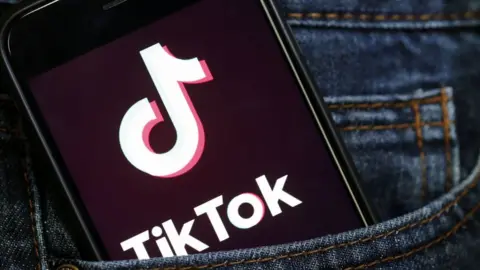TikTok: All under-16s' accounts made private
 Getty Images
Getty ImagesTikTok users aged under 16 will have their accounts automatically set to private, as the app introduces a series of measures to improve child safety.
Approved followers only can comment on videos from these accounts.
Users will also be prevented from downloading any videos created by under-16s.
TikTok said it hoped the changes would encourage young users to “actively engage in their online privacy journey”.
“We hope to inspire them to take an active role and make informed decisions,” head of privacy Elaine Fox said.
Those aged between 13 and 15 will be able to approve "friends" for comments and choose whether to make videos public.
But those accounts will also not be "suggested" to other users on the app.
The accounts of 16- and 17-year-olds will prevent others downloading their videos - but the youngsters will have the ability to turn off this restriction.
In addition, TikTok is changing this age group's default settings to allow only their chosen friends to "duet" alongside them - the name given to a facility that allows a user to record themselves in a clip then played adjacent to an earlier recording, so they can be watched simultaneously.
Users will not be allowed to duet with clips made by under-16s.
The move comes after a BBC News investigation revealed the platform could be vulnerable to online grooming.
TikTok already has several settings in place to protect its younger users, including:
- restricting direct messaging and live streams to over-16s
- restricting the buying, selling and receiving of "virtual gifts" to adults
- enabling parents and caregivers to have greater control, with linked accounts allowing them ultimate power
The NSPCC charity welcomed the new “bold package of measures”, saying it would reduce opportunities for groomers to contact children.
“It comes as abusers are taking advantage of the pandemic to target children spending more time online," head of child-safety online policy Andy Burrows said.
"And we urge other platforms to be similarly proactive.”
